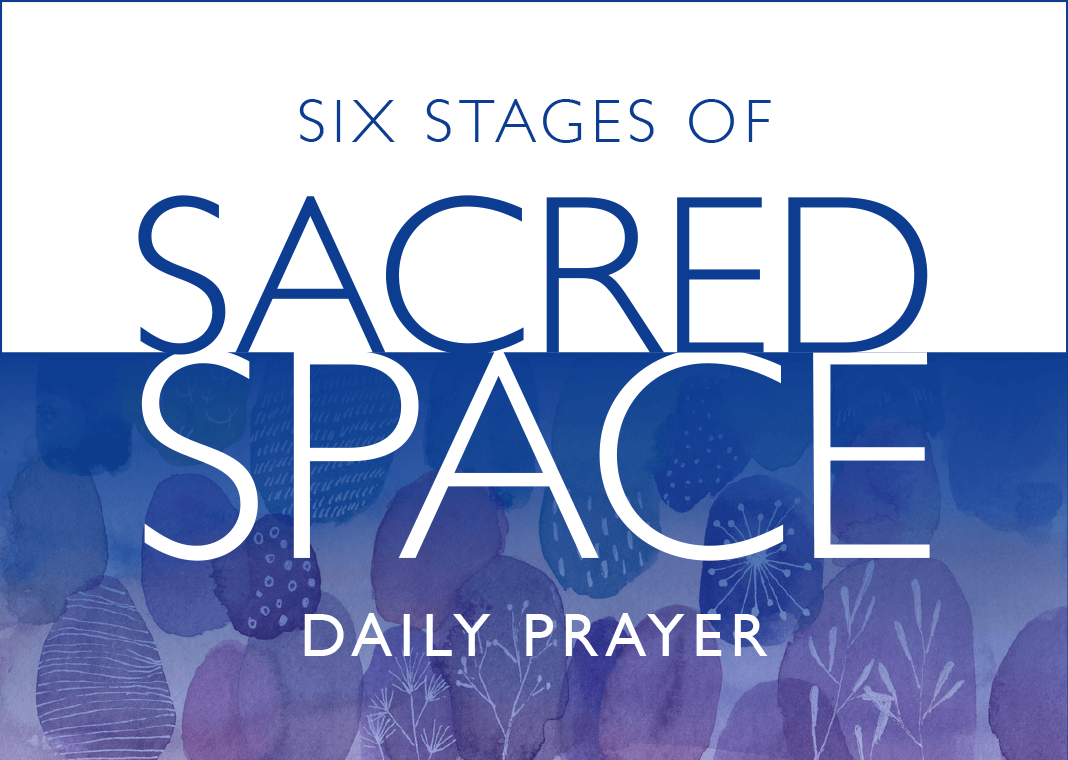Editor’s note: Sacred Space: The Prayer Book 2026 suggests six steps of prayer and contemplation for exploring the daily Scripture passages: The Presence of God, Freedom, Consciousness, The Word, Conversation, and Conclusion. We’ve invited our Ignatian bloggers to explore each step in our continuing series.
The Word
God speaks to each of us individually. I need to listen, to hear what he is saying to me. Read the text a few times, then listen. (The Irish Jesuits, Sacred Space: The Prayer Book 2026)
During my first pregnancy, there was some ambiguity regarding my due date. One ultrasound exam suggested the beginning of May and another the end of May. I felt a desperate need for clarification. At the time, I had a daily reader in which each day featured a short Scripture passage and a reflection based on those verses. I prayed, asking God to give me some clue about when my baby would arrive.
I turned to the chapter for May and read through each day’s reflection, searching for a hint. Only the passage on Mother’s Day (May 14 that year) made me think of a baby, but that seemed too obvious. I closed the book disappointed, convinced that God wasn’t going to give me a sign. When I delivered my son on Mother’s Day, it felt like God had a really good sense of humor.
Looking for a sign often means asking God to reveal his will through something external: circumstances, events, or unusual happenings that point the way. It’s guidance that comes from outside of us.
But in praying with Sacred Space: The Prayer Book, what we seek is different. Instead of looking outward for a sign, we place ourselves before God while reading Scripture slowly and attentively, allowing God to speak to our hearts through the Word. The focus is not on external confirmation but on an inner stirring or quiet clarity that grows from prayer.
This kind of reading or listening comes from a posture of accepting what God is revealing, trusting that we will get what we need, when we need it. In the example above, I wanted to know my due date. I didn’t want to wait. But when I go to the living Word of God and read it with an open heart, I am living out St. Ignatius’s Principle and Foundation. I accept my role in God’s world in his time.
One Friday evening during a difficult time, I opened my missal to the prayers for Vespers, and Psalm 46 appeared. As I read the passage about God’s protection for me no matter what, I felt calm begin to push the anxious thoughts aside. Then toward the end of the psalm, I read: “Be still, and know that I am God!”
I’ve heard this phrase many times, and yet the word still jumped out at me. Looking up the definition, I was offered these meanings: motionless, calm or at rest, silent, coninuing or lasting without change. At its root the word means standing firm, unmoving and quiet.
The night that I pulled out my missal to read Psalm 46, I’d unconsciously gone into fight, flight, or freeze mode. I began planning what I would do if a particular scenario occurred. I was devising ways to handle a situation that might or might not occur. Like a chess player plotting out my next four moves, my anxiety began building. I’d almost worked myself into a full panic.
The call to be still helped me notice what I’d been doing. I reread the words, “Be still, and know that I am God!” I stopped and took a few deep breaths. I asked God to help me be still. I imagined a stream of running water gathering into a deep, quiet, and calm pool. Like those deep, cool waters, I tried to remain calm, allowing things to settle further so that I could see through what was happening.
I see how God communicates with me all of the time. Sometimes the message isn’t as clear.
“Be still and know” bubbles up again. I am not alone. God is with me. He is bigger than I and is my protection. Practicing stillness long enough, I naturally begin to “know that God is God, and I am not.” I don’t have to do anything. God can take over. Remaining motionless and trusting allows peace to begin to enter my being.
As these thoughts unfold, I see how God communicates with me all of the time. Sometimes the message isn’t as clear. Sitting with it a little longer allows it to unfold. Maybe I’m not ready for the entire message. But with time, it will reveal itself. God is patient and loving.
The Word holds the key to my life. It is a way for God to direct my life. Returning to it each day teaches me more about who God is and who I am as his creation. The Word keeps us properly ordered in our relationships with God.
Try the Sacred Space way of praying this Advent. Sacred Space for Advent and the Christmas Season 2025–26 is now available for only $5.


Thanks for the reflection. You remind me of Matthew 10:19, Mark 13:11, and Luke 12:11-12. According to the Good News, we are invited not to worry about how we are to speak or what we are to say, because in that hour what we are to say will be given to us. Very consoling.
I will offer prayers for you and your husband, Katy.
really nice, Jean!
Thanks, Loretta!
A timely post for me, today.
Currently awaiting test results for my husband, which we will get to know on Friday, of course I am scared.
Thank you for your post.